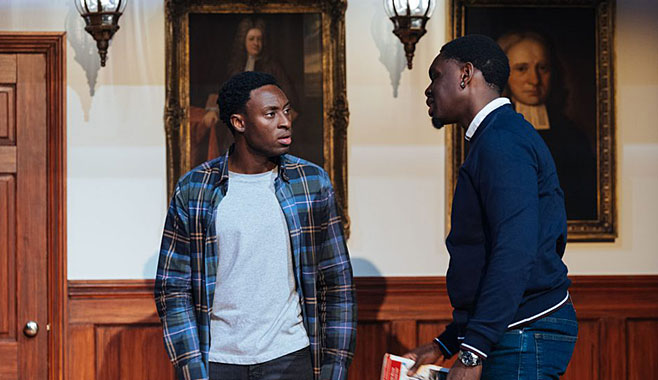Theatre
Safe space
Minerva Theatre, Chichester
4/5
Smart a cappella college comedy
Personal and political wrestle in this highly entertaining and clever comedy on American college politics. The world premiere of Jamie Bogyo’s first play, in which he also stars, surprises with its mature and smooth structure and dialogue, and although in the second half it shows strains of inexperience, it still delivers an impressive commentary on how our political opinions are formed and developed.


The play centres on Conor, played by Jamie Bogyo, and Isaiah, played by Ernest Kingsley Jr., who are room mates at Calhoun College, Yale in 2016/17 when a student campaign is underway to rename the college and thus remove the name of John C Colhoun, who as well as being a successful and respected politician of the pre-Civil War era, was not only a slaveowner, but also a promoter of slavery. The students are forced to take sides and form opinions, and they do so with wit, consideration and frustration, and under the weight of peer pressure, personal circumstances and temperaments. The part that youthful inexperience and exuberance play in the forming and breaking of alliances is astutely and sensitively portrayed. As is often the case in group interactions, and indeed in debating, the need to counterbalance other views even if in doing so you are not expressing your own, is present throughout the play.
Conor is a traditional white Republican, and although in complete agreement that racism should be condemned, he is against the renaming of the college and is irritated by the virtue signalling behaviour of his peers. His best friend Isaiah appears to agree with him but is really still quietly making up his own mind. Isaiah has some of the best lines when confronting his friend Omar, bringing balance to the discussion. But Isaiah’s emotional immaturity is more painfully shown in his relationship with Annabelle, Conor’s girlfriend.

The play starts with a music number sung a cappella by Isaiah, introducing one of the main themes of the evening. Conor and Isaiah are both in the Yale a cappella group, the Whiffenpoofs, and this is really where their passion lies. The true ‘safe space’ from the title is not created by the renaming of the college, but by singing with others. The play is interspersed with pieces beautifully sung by Conor and Isaiah and this works exceedingly well. It is clear that singing is fundamentally another one of Bogyo’s skills and passions, and this translates very well into the narrative of the play without turning it into a musical.
The characters are drawn and developed with sensitivity. The remaining three characters, who gravitate around Conor and Isaiah, Connor’s girlfriend Annabelle (Céline Buckens), Annabelle’s friend and rival Stacy (Bola Akeju) and Isaiah’s friend Omar (Ivan Oyik) are all fairly well-rounded. The icily ambitious Stacy is perhaps the most two-dimensional at times, but her role is really to bring tension and challenge Annabelle and Omar’s viewpoints. Although we don’t find out a lot of detail about the characters’ backgrounds, the mix of race, class and wealth is sufficient to bring to the fore the interplay of personal and political which powers the action.

Khadija Raza’s appropriately wooden-panelled set easily transports us to the Ivy League, although the frequent changes of set in the second half seem unnecessarily laborious. The action takes place in students’ rooms and the courtyard where the Colhoun’s statue is wheeled in and out like Darth Vader, somewhat humorously but with ominous undercurrents. The stained-glass window in the room of wealthy Omar, portraying Colhoun with slaves, is shattered not by the black students, but by Connor in a fit of personal despair over his relationship with Annabelle, which proves once again that change happens for a variety of reasons and motives, not always the right or obvious ones, and sometimes quite accidentally. Roy Alexander Weise’s direction contributes to the ease of the production, balancing the different sides of the argument to amusing and thought-provoking effect.
Whether the college will be renamed or not is not what matters most in the play, although Calhoun College was indeed renamed Grace Hopper College in 2017 and with that in mind the play can more safely proceed to challenge the debate. Bogyo attempts to show how this could have played out at the human level and that change is not linear or straight-forward, particularly in a combustible environment of university where students for the first time get a flavour of what it is like to have the opportunity to enact social change, however minor or symbolic it may be. The sensitive but light-touch approach explores serious topics from an unexpected angle. It is the passions that you develop at university that really stay with you, whatever they are, and in this sense, politics is completely equal to music.
